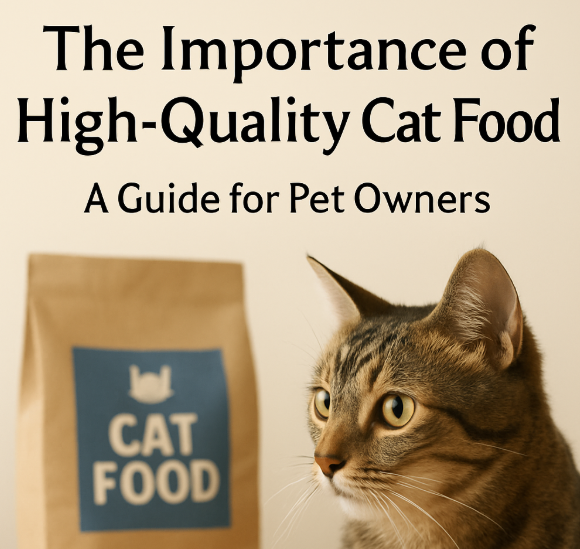The Importance of High-Quality Cat Food: A Guide for Pet Owners… Discover why choosing high-quality cat food is essential for your cat’s health and happiness. Learn how to identify nutritious ingredients, improve digestion, and support a shiny coat with our expert guide for Australian pet owners.
Cats are known for their independence, agility, and playful personalities. As loving pet owners, ensuring our feline friends remain healthy and happy is a top priority. One of the most important factors contributing to their well-being is a nutritious diet. This article delves into the significance of high-quality cat food and provides guidance on making the best dietary choices for your furry companion.
Why Invest in High-Quality Cat Food?
When it comes to cat food, you often hear the phrase, “you get what you pay for.” While it may be tempting to opt for cheaper brands, investing in high-quality cat food can yield countless benefits for your pet’s health, longevity, and mood. Here are some reasons why prioritizing quality is crucial:
1. Nutritional Value
High-quality cat food is formulated with a careful balance of proteins, fats, carbohydrates, vitamins, and minerals. Quality ingredients contribute to:
- Stronger Immune System: A diet rich in essential nutrients helps boost your cat’s immunity, making them less susceptible to illnesses.
- Healthy Weight Maintenance: Premium foods typically use lean proteins and healthier fats that can maintain a cat’s ideal weight, reducing the risk of obesity-related conditions.
- Improved Digestive Health: High-quality ingredients are more easily digestible, which can lead to fewer gastrointestinal issues such as vomiting and diarrhea.
2. Ingredient Transparency
In the world of pet food, transparency is vital. High-quality cat food brands often provide detailed information about their ingredients, sourcing, and manufacturing processes. Look for:
- Real Meat as the First Ingredient: Cats are obligate carnivores, meaning they require a diet primarily made up of meat. The first ingredient should ideally be a named source of protein (like chicken, turkey, or fish).
- Whole Foods: Quality cat foods include whole foods and avoid fillers, preservatives, and artificial additives that may have negative health effects.
3. Health Benefits
Good nutrition has a direct impact on your cat’s overall health. Choosing high-quality food can lead to:
- Healthier Skin and Coat: Essential fatty acids and proper nutrition contribute to a shiny and healthy coat, while also preventing skin issues such as itching and dryness.
- Better Dental Health: Some high-quality cat foods incorporate components that help reduce dental plaque and tartar buildup, promoting oral hygiene.
- Prevention of Common Health Issues: Proper nutrition can mitigate the risk of various health problems, including urinary tract infections, diabetes, and kidney issues.
How to Choose the Right High-Quality Cat Food
With so many options available, selecting the best food for your cat can feel overwhelming. Here are some tips to guide you through the selection process: Examine the ingredient list and nutritional information on cat food packaging. Avoid products that list by-products or fillers as primary ingredients. Kittens, adult cats, and senior cats have different nutritional requirements. Choose food that is specifically formulated for your cat’s age and activity level to meet their specific needs.
Your vet can provide valuable insight into the best dietary choices for your cat based on their individual health, age, and lifestyle. If you decide to change your cat’s diet, do so gradually to avoid digestive upset. Mix the new food with the old food over the course of several days, gradually increasing the proportion of the new food.
High-quality cat food is an investment in your pet’s health and happiness. By selecting a nutritious, well-formulated diet, you can help your feline friend live a longer, healthier life. Remember to stay informed, consult with your veterinarian, and make choices that prioritize quality and transparency. Your cat will thank you with purrs and affection!

FAQ
1. Why is high-quality cat food better for my cat?
High-quality cat food provides balanced nutrition made from real, wholesome ingredients. It supports your cat’s immune system, maintains a healthy weight, and promotes better digestion compared to cheaper foods that often use fillers or artificial additives.
2. How can I tell if my cat’s food is high quality?
Check the ingredient list — the first ingredient should be real meat like chicken, turkey, or fish. Avoid foods with vague terms like “meat by-products” or “animal digest.” Quality brands are transparent about ingredient sourcing and use minimal artificial preservatives or colours.
3. Can switching to better food improve my cat’s health?
Yes! Many cat owners notice improvements such as shinier coats, more energy, better digestion, and fewer health issues after transitioning to high-quality food. Always make dietary changes gradually to avoid upsetting your cat’s stomach.
4. How often should I feed my cat high-quality food?
Most adult cats do well with two meals per day, but frequency can vary depending on age, activity level, and specific dietary needs. Consult your vet to determine the right feeding schedule and portion size for your cat.
5. Is wet or dry cat food better?
Both can be beneficial. Wet food provides hydration and is easier to chew, while dry food can support dental health. A combination of both often gives the best balance of nutrition and texture variety for your cat.
6. Do senior cats need special food?
Yes, older cats benefit from food formulated for senior health — often lower in calories but rich in protein, fibre, and nutrients that support joint and kidney health.
7. Should I ask my vet before changing my cat’s diet?
Absolutely. Your vet understands your cat’s health history and can recommend the best type of food, especially if your cat has allergies, sensitivities, or underlying health conditions.

